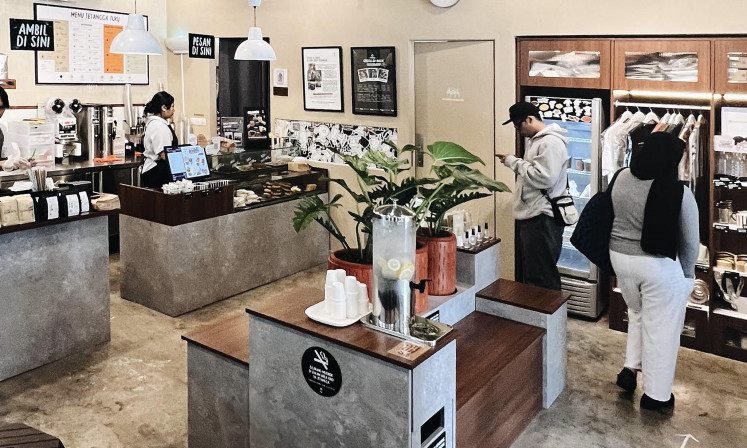Popular Reads
Top Results
Can't find what you're looking for?
View all search resultsPopular Reads
Top Results
Can't find what you're looking for?
View all search resultsApindo inks MoUs to boost local SME exports
The Indonesian Employers Association (Apindo), representing large enterprises in the country, has renewed its commitment to assist small and medium enterprises (SMEs) to improve their competitiveness and to market their products overseas
Change text size
Gift Premium Articles
to Anyone
T
he Indonesian Employers Association (Apindo), representing large enterprises in the country, has renewed its commitment to assist small and medium enterprises (SMEs) to improve their competitiveness and to market their products overseas.
Apindo chairman Sofjan Wanandi said on Monday in Jakarta that large enterprises and the government should help SMEs grow by offering assistance, such as financial aid and capacity building.
“The capability of small and medium enterprises is limited. That’s why the government and large enterprises should create synergy to accelerate the development of SMEs so that they can progress faster,” he said.
Sofjan made his comments at an event marking the signing of memorandums of understanding (MoUs)between Apindo and the Trade Ministry, the Industry Ministry and the Small and Medium Enterprise Association of Japan.
“We must unite. We should not compete with our domestic competitors. Our enemy is now globalization,” Sofjan added.
Enterprises of every size had unique roles to play in the economy, he said. Large enterprises could boost economic growth while SMEs distributed income, he said.
Sofjan said that Apindo and the Trade Ministry would help SMEs gain better access to overseas markets by offering training, promotions and information on export opportunities, especially those related to social compliance rules in developed countries.
Trade Minister Mari Elka Pangestu, who was also at the event, said that such assistance was important as SMEs usually faced obstacles when exporting products, such as the administrative requirements needed to access preferential trade agreements.
“According to our data, around 20 percent of the applications to benefit from low-duty facilities come from SMEs and around 5 percent come from micro-enterprises. We want to increase the use of this facility through cooperation with Apindo,” she said.
Mari added that through the cooperation the government would improve the awareness of local SMEs on safety and labor standards so as to comply with international standards, such as child labor prohibitions and minimum wage standards.
“Garment producers, for example, should now fulfill the Worldwide Responsible Apparel Production [WRAP] initiative, under which labor aspects are taken into account by buyers, who even require social audits,” she said.
Sofjan said that Apindo would also team up with the Industry Ministry to improve the quality, designs, and brands of products made by SMEs.
“In the near term, for example, we will conduct training on how to make charcoal from coconut shells, as several of our SMEs have received orders from China,” he said.
Apindo, Sofjan said, would also cooperate with the Japanese SME association to encourage technology transfer from Japanese to local SMEs and to motivate Japanese SME garment and craft production centers to relocate to Indonesia to reduce production costs.
“Japanese small enterprises will cooperate with Indonesian SMEs to produce their products here for export to Japan,” he said.










